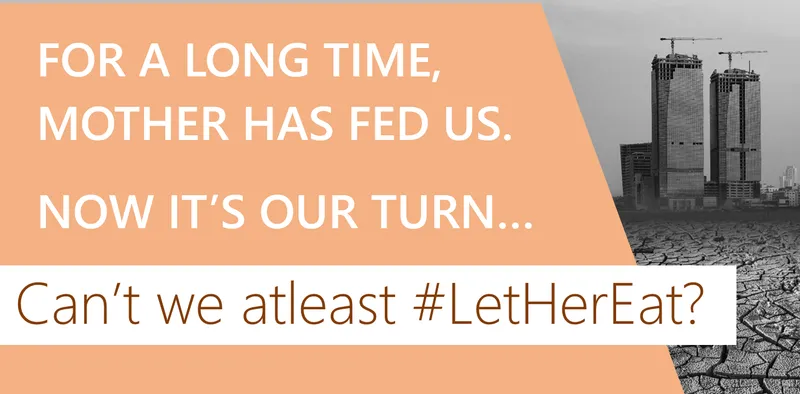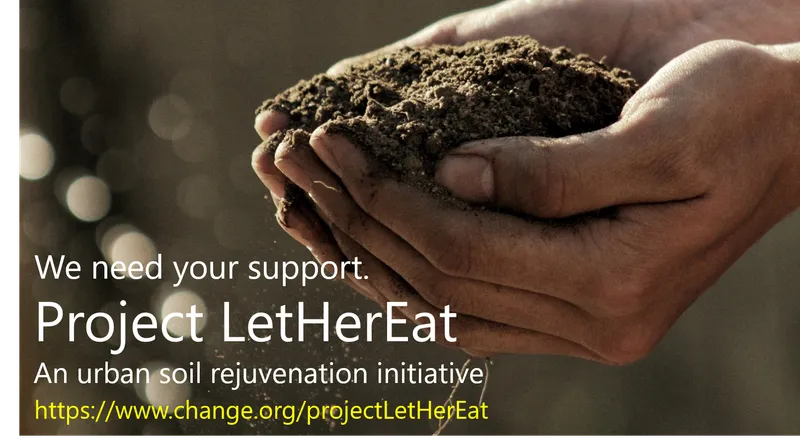

This IIT Delhi Graduate Turned Author Develops An Urban Ecosystem Restoration Project
Anshul Kapoor, an IIT Delhi graduate and author of ‘sustainability satire’ novel Fosters of Fall has developed an environmental restoration project named LetHerEat that focuses on improving the foundation of the urban ecosystem: the urban soil.
The events of 2020 make it seem like a dystopian thriller, and while this may provoke one’s imagination, the suffering is far from imaginary. With rising pollution levels, insufficient water and food, and excessive population, the previous years were already signalling a threat. And now 2020 makes all that appears like a fairy tale. The COVID-19 crisis is just one of the many challenges, perhaps not even the most deadly one, which was followed by several natural disasters, disruption of economy and livelihood, and rising tension among global powers.
The 2020 Retrospection
Among other things, this year also brings a mirror to show us what we are doing and where we belong, and to cure us of our vanity. It shows us that we are, at best, a small part of the planet and should not assume the position of its controller. Medical scientists predict that one possible way that the corona crisis will end is that the virus and the human body will adapt to one another, and both will continue to survive together. Else, the virus must get eradicated. Even a pathogenic parasite is said to have ‘evolved’ when it mutates to survive in its host without killing it.
But are we applying the same principle for our evolution? Are we evolving to survive with our host or to take control of it? The limitless human capability that has become the controller of nature has also become the foundation of human-led evolution. We see it as a solution to all our problems and deploy it to ‘correct’ the natural disruptions the world is facing. But can this be considered ‘evolution’ in the current Human-Earth context?
Fundamentally, the basis of evolution is survival and not blind capability. Although the two are usually inseparable, that’s not always the case. The virus’s absolute control and influence on all of the host’s organs may make it very capable, but may also become an impediment to its prolonged survival; thus being an evolutionary disadvantage.
The New Need Of The Hour
The need to preserve Earth’s natural state is increasingly getting realized, and governments are working to repair the planet. Repair it! Like it is a machine or a product. But, living systems have not got fixed. A wound or sickness has not got mended. It is allowed to heal. And, this is the irony of the immense human capability. We are trying to repair the Earth – through external influences and controls, rather than allowing it to heal. So, this surely cannot be a sustainable way of achieving health and prosperity. Developing air and water filtration systems, augmenting and harnessing natural processes, restoring some environmental features while ignoring the others etc. are repair systems which only give us the illusion of ecological restoration.

#LetHerEat: The Environmental Restoration Project By Anshul Kapoor
Environmental systems are not independent of one another. Plant, animal and human life, climate and weather patterns, air and water cycles, natural stability and disasters etc. are all parts of a complex network. Everything touches everything else, and in most restoration measures focused on specific human-needed aspects of nature, the importance of the environment as a single, complex entity gets often overlooked. Without a holistic system that allows nature to heal appropriately, current human efforts remain like plastering a wound every day without allowing it to heal. We keep improving our plastering abilities hoping that one day we can heal the planet externally. But that may not be possible.
With the growing population and urbanization, the disruptive human influence on nature is getting concentrated and making the urban ecosystems increasingly hazardous for human health and future. To overcome this deficit, Anshul Kapoor – an IIT Delhi graduate and author of ‘sustainability satire’ novel Fosters of Fall – has developed an environmental restoration project aimed at naturally restoring urban ecosystems and their biodiversity.
#LetHerEat - Restoring Urban Soil
The project named LetHerEat focuses on improving the foundation of urban ecosystems – the urban soil. Restoring urban soil health and functionality is expected to increase overall ecosystem health and services in the long run. Regrettably, though, the urban soil is usually locked under an expanding concrete cover and forgotten. Open lands which got left for green areas become the sink of various urban pollutants and pose health risks to urban residents. As urbanization continues, the long term hazards resulting from poor urban soil health keep intensifying.
‘The soil is the mother of all life. It is also the mother of ecosystems’, says Anshul about the project. ‘And like all living beings; it also needs air, food and water to remain healthy. But ignored and forgotten, this mother is getting weak and sick. She is starving, and with her, the entire ecosystem is starving. A starved and frail ecosystem cannot recover effectively. It is time that we, as her responsible children, nurture her and allow her to heal to bring back her natural, life-giving state.’
Research has shown that urban soils are usually severely depleted in nutrients and biodiversity, and this can degrade the terrestrial ecosystems, air and water quality, climate patterns, plant and even human health. Human immunity also gets shown to be dependent on soil quality and exposure. Perhaps this is one reason why urban residents usually have weaker resistance than residents in rural areas. Soil health is also essential for the absorption and decomposition of pollutants. Without the foundation of healthy soil, many urban environment improvement measures – like tree plantations, air and water cleansing, and pollution control - will remain ineffective or even futile.

One can anticipate that if this ecological starvation continues, the urban ecosystems will soon cease to support any life, transforming the bustling Indian cities into ghost towns and threatening the life span and well-being of millions of urban residents. In the advent of worsening things, many environmental preservation measures never see the light of execution due to their negative impact on the economy and human comfort. Overcoming this hurdle, Project LetHerEat also promises to offer short to medium term benefits like employment opportunities, local economic development and improved food security in urban areas, in addition to environmental restoration in the long term.
To highlight this need, Anshul has submitted a detailed project scheme to the Prime Minister Narendra Modi and Ministry of Housing and Urban Affairs and requested their attention on Twitter. The appeal to the Prime Minister can get read here. Anshul has also started a petition to seek public support. And, bring this need to the attention of the decision-makers.






